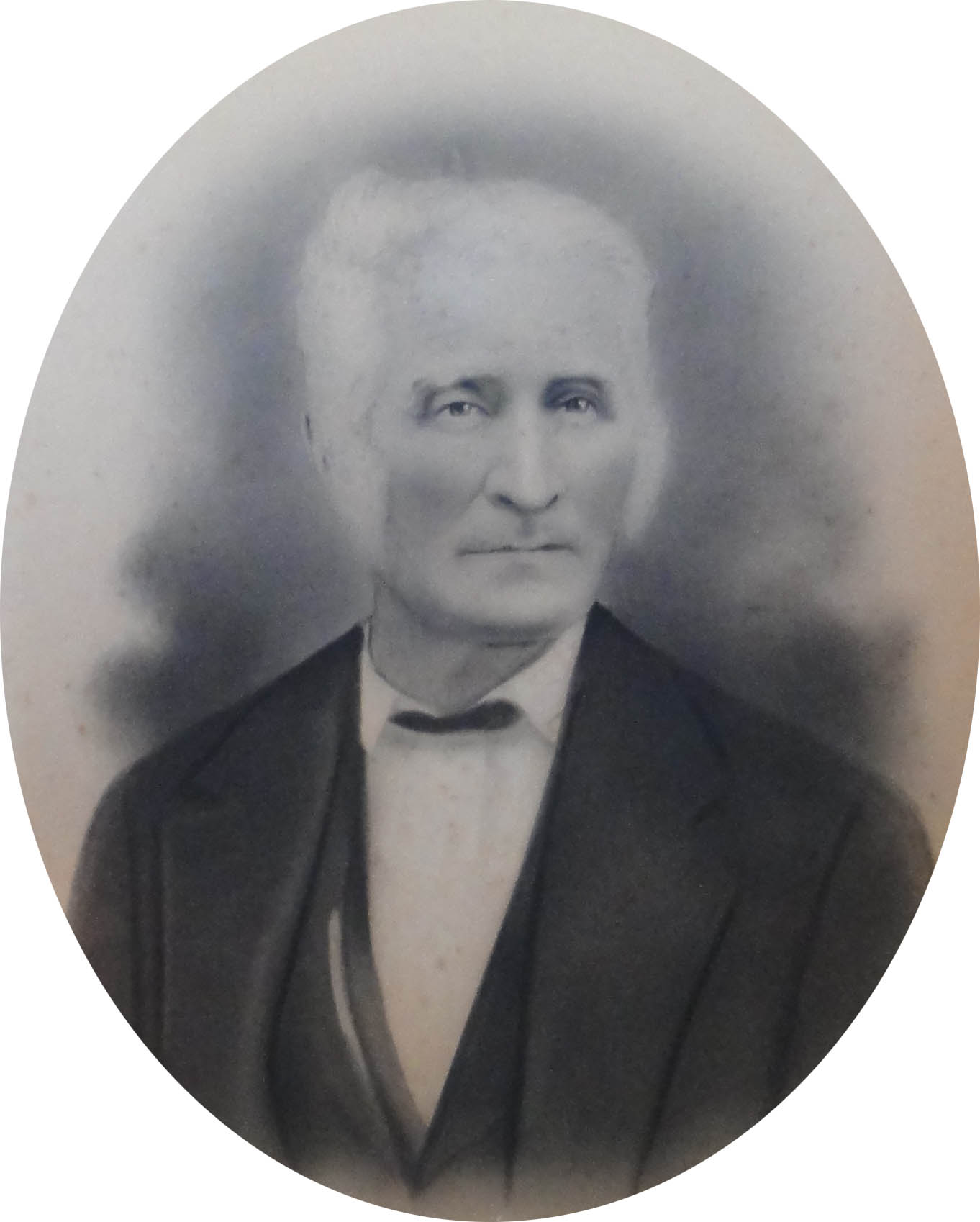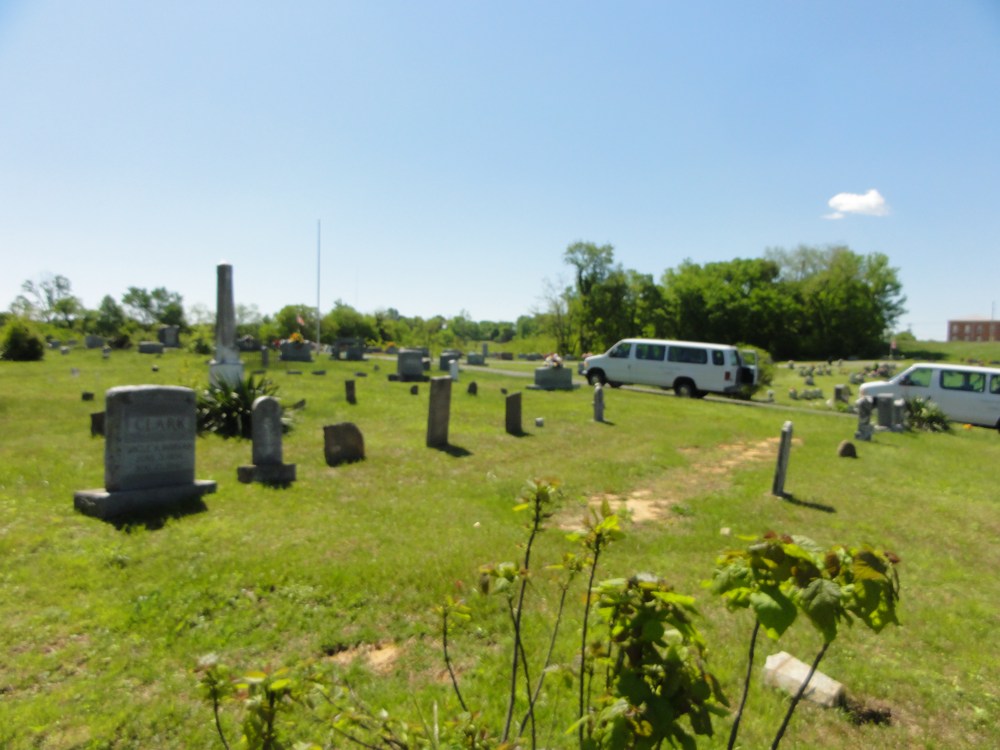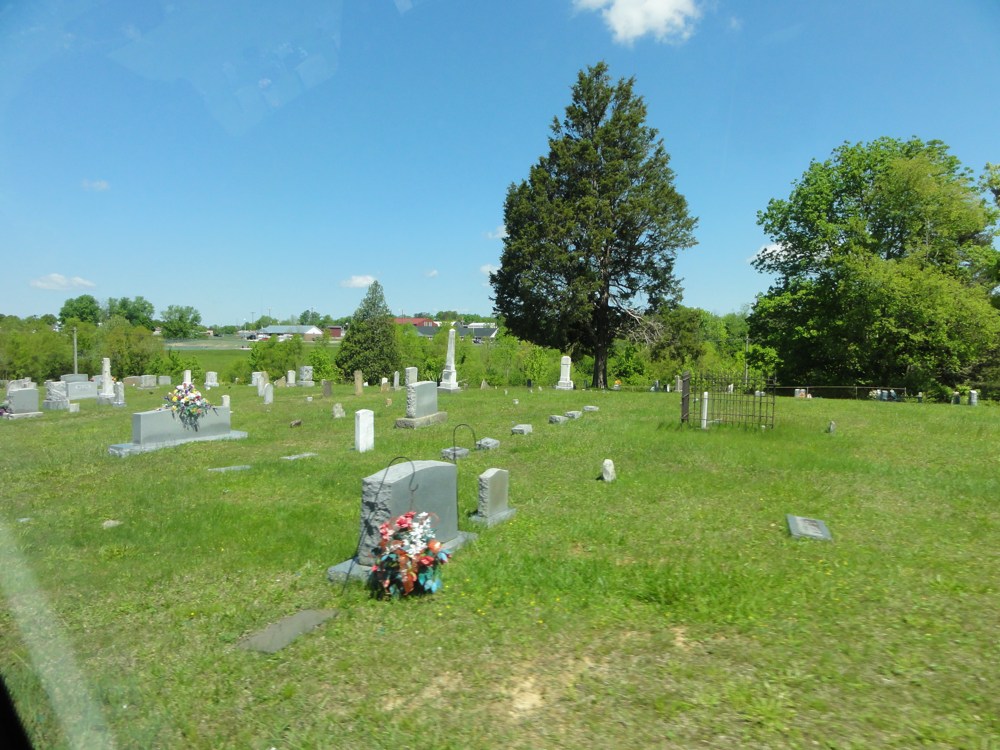William Davis Carnes
(1805-1879)
Biographical Sketch On The Life Of W.D. Carnes
William Davis Carnes was born in Lancaster District, South Carolina, on November 23, 1805. His father, Alexander Carnes, moved to Warren County, Tenn., and opened one of the finest stores in McMinnville, in 1809. The next year his father died, and after a few years his mother moved to Rutherford County, Tenn. Young Carnes had a thirst for knowledge from his youth up, and he allowed nothing to turn him aside from the pursuit of it. At the age of eighteen he taught his first school in Woodbury, Tenn. He taught only a night school, and had many students much older than himself.
W. D. Carnes, was reared in the Presbyterian faith. His father and mother were devout Presbyterians after the old-school type of Presbyterians. They were very strict in their religious life, and impressed the faith of their church upon their children in early life. However, W. D. Carnes was an independent thinker. He wished to investigate any position which he was supposed to hold. This he did in regard to his religious belief. He took time to read the New Testament, and found that nowhere in it was mentioned the Presbyterian Church. While teaching at Woodbury he heard the gospel preached for the first time in its simplicity by Abner Hill, and he at once accepted it and consecrated his life to the cause of Christ. He began preaching under the guidance of Dr. William Jordan and Abner Hill. He traveled in their company through Tennessee, Kentucky, Indiana, and Illinois. He showed great ability as a young preacher. He studied hard to understand the Bible, and gained a very thorough knowledge of it. He went into the mountains of East Tennessee on a preaching tour, and finally he went into Sequatchie Valley. The meetinghouses of the denominations were closed against him, but he went into the dwelling houses of the people who would permit him and preached the gospel with much success. During his work in this section he met and baptized Miss Elizabeth Billingsley. Later, in June, 1826, he married Miss Billingsley.
After his marriage he located in Bledsoe County, where he purchased a small farm and mill, two and one-half miles from Pikeville. His attention was now given to his farm and mill. He made a success of this work and soon accumulated enough to help defray his expenses in college. During this time he met and farmed the acquaintance of a Mr. Whiteside, a very shrewd lawyer of that day. Mr. Whiteside was an infidel, and Brother Carnes had many discussions with him on the subject of religion. One day during a discussion Mr. Carnes asked him the following question: "Have you examined the evidences on which the belief of Christianity is based?" Mr. Whiteside replied: "No, not thoroughly." Brother Carnes replied: "Now, as an intelligent man and a lawyer, what would you think of a juror who, when called into court, would declare himself ready to render a verdict without having heard the evidence?" This question put Mr. Whiteside to thinking; so he investigated the evidences as given in the Bible and finally accepted Christianity.
Mr. Carnes was not satisfied with his education at this time, and determined to take a course in college; so he rented his farm and mill and moved to Knoxville, Tenn., and entered the East Tennessee University. He remained here and completed his course, receiving the degree of Bachelor of Arts. He was now thirty-seven years old. He was asked to take charge of the preparatory department in the university. He did this, and made a success of it. During this time he had no time to give to preaching the gospel; all his time was given to study and teaching.
His
property near Pikeville had been rented and needed his personal attention;
so he moved back to it and taught in Pikeville for a year. In 1850 he was
called to the presidency of Burritt College, at Spencer, Tenn., and served
in this position eight years. The college prospered under his direction.
He was next elected president of the State University at Knoxville. He
served in this capacity for one year, then sacrificed his position as
president of the State University to become the president of Franklin
College, near Nashville, Tenn. This was a college operated and
maintained by the encouragement of Christian people. Many of the leading
members of the church realized the need of educating their boys and
girls so that they would be the greatest possible help to the church.
Brother Carnes traveled in behalf of the college during the summer of
1860, and made a tour through several Southern States in the interest of
Franklin College. When the session opened in September, there was a large
and enthusiastic body of young men from all the Southern States, except
Florida. At this time the War Between the States was evident, as the
Southern States were seceding from the Union after the election of Mr.
Lincoln as President of the United States. The
war completely destroyed all prospects for a successful school, as there
were only a few of his students left at the close of the term in June,
1861. Some of President Carnes' boys were in the army, and he moved his
family back to Pikeville. We next find him, in 1865, shortly after the
close of the Civil War, serving as president of Manchester College,
Manchester, Tenn. He served in this capacity seven years. During his
residence in Manchester he established a church and did much evangelistic
work in and around Manchester. In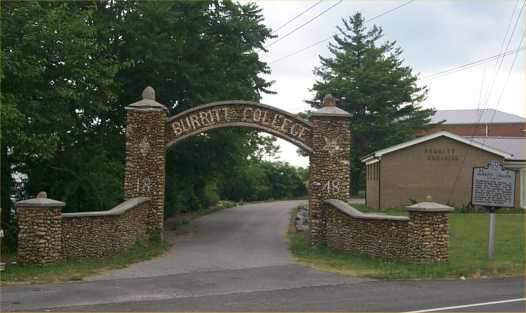 1872 he was called to the presidency of Burritt College for the second
time, and remained there until 1878. In this same year be was elected
president of Waters and Walling College, at McMinnville, but resigned on
account of ill health and retired to his quiet home at Spencer. Here he
died on November 20, 1879.
1872 he was called to the presidency of Burritt College for the second
time, and remained there until 1878. In this same year be was elected
president of Waters and Walling College, at McMinnville, but resigned on
account of ill health and retired to his quiet home at Spencer. Here he
died on November 20, 1879.
For about a half century W. D. Carnes labored as an educator in Tennessee, and he held many positions of honor. As an educator, he was progressive and practical. He held lofty ideals before the young people and inspired them with noble aspirations. He always encouraged his students in athletic sports. He was firm but kind in discipline. He was in sympathy with his students and always gave them encouragement. They loved him for his merits and spoke of him affectionately as "Pap" Carnes. When the writer was a student in Burritt College in 1899 and 1900, he heard many references made to "Pap" Carnes, and the good work which he did while president of the college.
He loved the Bible, and he loved to study it and to teach it. While president of Burritt College, he established the regulation that every student should study and recite one lesson a week in the Bible; this was on Sunday, or the first day of the week. He was firm in enforcing this regulation. He believed that a knowledge of the Bible was necessary to an all-round practical education, and he believed that the principles of the Bible were essential in developing character and making manly men. Wherever he taught, he established a church, if one was not already in existence there when he began teaching. He worked with the church where he lived and was a great help in church work. He preached as opportunity was given him under the stress of school duties. As a preacher, he was logical, clear, and forceful, and no one listened attentively to his sermons without understanding definitely the points which he stressed. His preaching in middle life and late in life had the marks of a teacher, and this made him a great help to the church.
The church of our Lord since the Restoration has made much progress through education. The slogan of Alexander Campbell was: "Let there be light." He wanted light on every subject. The educators of the church have been a great blessing, for they have trained young men who have become leaders in church work; and without leaders no cause can make much progress. The better trained and qualified in heart and life the leaders are, the greater promise will any cause make. Brother Carnes combined the two great callings of life, the teacher and the preacher. No greater work can be done than that of the Christian teacher and the gospel preacher. These were combined in W. D. Carnes. He was one of the pioneers in this field. We should praise God for his life and labors, the young generation should revere his memory, and all should thank God for his influence in the world.
He was buried at Spencer. Almost under the shadow of the college building his dust rests. His friends and former students helped to place a modest monument at his grave, which marks the last resting place for his mortal body. On the marble monument is inscribed the following:
AT REST
Elder W. D. CARNES
Born October 23, 1805
Died November 20, 1879
Age 74 years, 27 days
"Blessed
are the dead who die in the Lord,
for they rest from their labors,
and
their works do follow them."
-From Biographical Sketches Of Gospel Preacher, H. Leo Boles, G.A. c.1932 page 120ff
![]()
W. D. CARNES
Wendell Bloomingburg
BIOGRAPHY
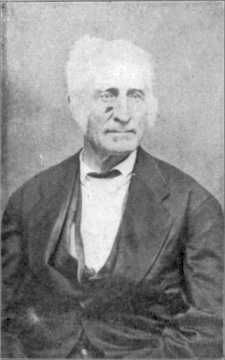
William Davis Carnes, eldest son of Alexander and Mary Davis Carnes of Mecklenberg County, North Carolina, was born in Lancaster district, South Carolina in 1805. When he was five, the family moved to McMinnville, Tennessee, where his father started a general merchandising store. When his father was robbed and killed on a business trip to Charleston, South Carolina, two-thirds of his estate of $40,000 was turned over to a brother as William's guardian but it was mishandled. With the remaining one-third his mother bought a farm in Milton in Rutherford County and reared William and a younger brother. Since his mother was a devout Presbyterian, William early developed his religious interests. He learned to read before he attended the county school. When he went to school, he read over and over his mother's library, the few books at school, and any book he could borrow from the neighbors except novels since they were taboo. He heard a gospel preacher and was baptized in 1822 and a year later began preaching at the Smyrna church in the Cumberland Plateau. On June 21, 1825, he married Elizabeth Billingsley, an elder's daughter. A grist mill and lumber mill helped pay off the mortgage on the homestead he bought. He was elected one term as justice of the peace in the Smyrna district but after that refused any political office.
TEACHING CAREER
At the urging of friends, he took the district school. He had agreed to do this if he received $40 a month which was about double the usual pay at that time. This began the career of more than half a century in Tennessee education, most of it as a college president.
EDUCATION
A professor James Garvin of the East Tennessee University insisted that he continue his education at Knoxville. When he enrolled at the university, he was nicknamed "Old Pap" because his son, Campbell, was in the preparatory department and his two daughters in the female institute. This name later was a term of endearment by his students and alumni. He completed the four-year course in three years. At the age of thirty-seven he received a B.A., and a M.A. when thirty-nine. After his first three years, he was made principal of the preparatory department and when he received his masters, he became Professor of English. He continued to preach when he could during school, but there was no congregation in Knoxville at the time. Due to an attack of fever, he moved back to the farm and was teaching locally there when the trustees at Burritt College asked him to first serve at the college. One thing which appealed to him was the free hand which he was promised. He was given permission to institute Bible reading and teaching at the school. Another change that he pioneered in was to make Burritt a co-educational school. There was quite a bit of opposition to the school because of this, but Burritt pioneered in coeducation in that area.
By 1853 the student body numbered 140. The board was pleased with his work and offered him a contract for twenty-five years. Carnes himself sold his farm and invested the money in Burritt stock which enabled the school to build three more small brick buildings to care for the enrollment. Drinking became a problem among some of the students and Carnes took the lead both locally and on the state level in the temperance movement. He was instrumental in getting the first prohibition law passed in Tennessee. The law forbade selling whiskey within four miles of a chartered school. So much feeling arose locally over the liquor issue that when his house burned in October, 1857 it was generally believed to have been an act of retaliation. Thus after eight years as president, he left Burritt in 1858 and became president of the East Tennessee University at Knoxville. In 1860, he wen1 to Nashville to assume the presidency of a newly proposed university of what had been Franklin College. Unfortunately, the Civil War came along and destroyed these plans. Later Carnes was president of Manchester College in Manchester, Tennessee. From there he went back to Burritt and served as president from 1872-78. His last duty was president of Waters and Walling College in McMinnville but he died after just seven months in November, 1879.
CONTRIBUTIONS
Norvell Young's evaluation of Carnes' work at Burritt was that "More than any one man, he shaped the policies and contributed to the reputation of the institution." In A Skelch ofthe Reformation in Tennessee by J. W. Grant, he says, "After the war, when Franklin and Irving Colleges had waned and fallen into neglect, Burritt College, at Spencer, Tennessee, came to the front under the management of such illustrious men as W. D. Carnes, Dr. T. W. Brents, and A. T. Seitz."
-Wendell Bloomingburg - 1981 - Freed-Hardeman University Lectureship, pages 34,35
![]()
Directions To The Grave
W.D. Carnes is buried in the old city cemetery at Spencer, Tennessee. Spencer is a beautiful old community on the top of a mountain in the hills of central Tennessee. To get there from Chattanooga, take I-24 travel west toward Nashville. After crossing Monteagle, take the Manchester exit, Hwy 55 and travel east toward McMinnville. Just east of McMinnville take Hwy.30 toward Spencer. In Spencer you come in behind the Van Buren County Courthouse on Hwy. 30. The road will wind around the front of the courthouse. Just as you pass it make the first left on Sparta St. Go to the third street on the right and turn right on Faye St. This street will come into the cemetery. Go into the cemetery and begin going up the hill. You will see the large stone to W.N. Billingsley on the left. Carnes grave is further to the left and up the hill from Billingsley's grave.
GPS Locations
35°44'58.2"N 85°27'44.2"W
or D.d. 35.749488, -85.462263
To Burritt College Campus
To go to the old Burritt College campus, go back to the Courthouse and turn left. Follow Hwy 30 around a curve, and on your left will be the old entrance to the college. The college closed in the 1930s, but the old building still stands. It is being used for office space by the town. There is a historical society there, but only manned by appointment. Ask for information at the Library on the old campus ground. I was there in June, 2002.

Spencer, Tennessee Town Cemetery
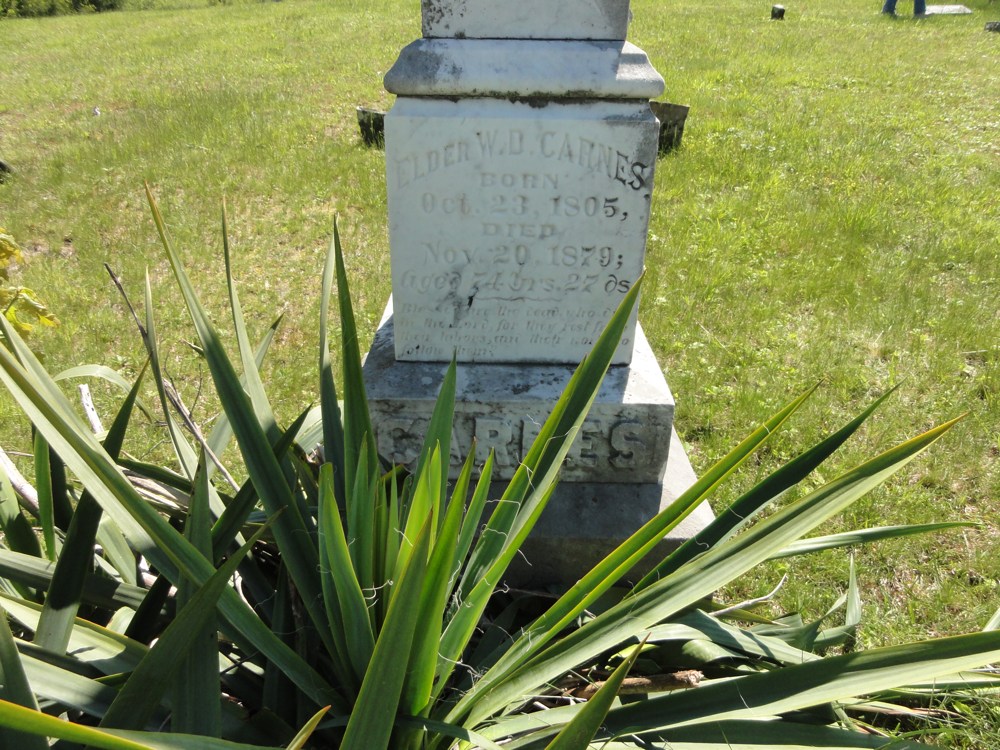
At Rest
Elder W.D. Carnes
Born
Oct. 23, 1805
Died
Nov. 20, 1879
Aged 74 Yrs. 27 ds.
Blessed are the dead who die,
in the Lord, For they rest from
their labors and their works do
follow them.
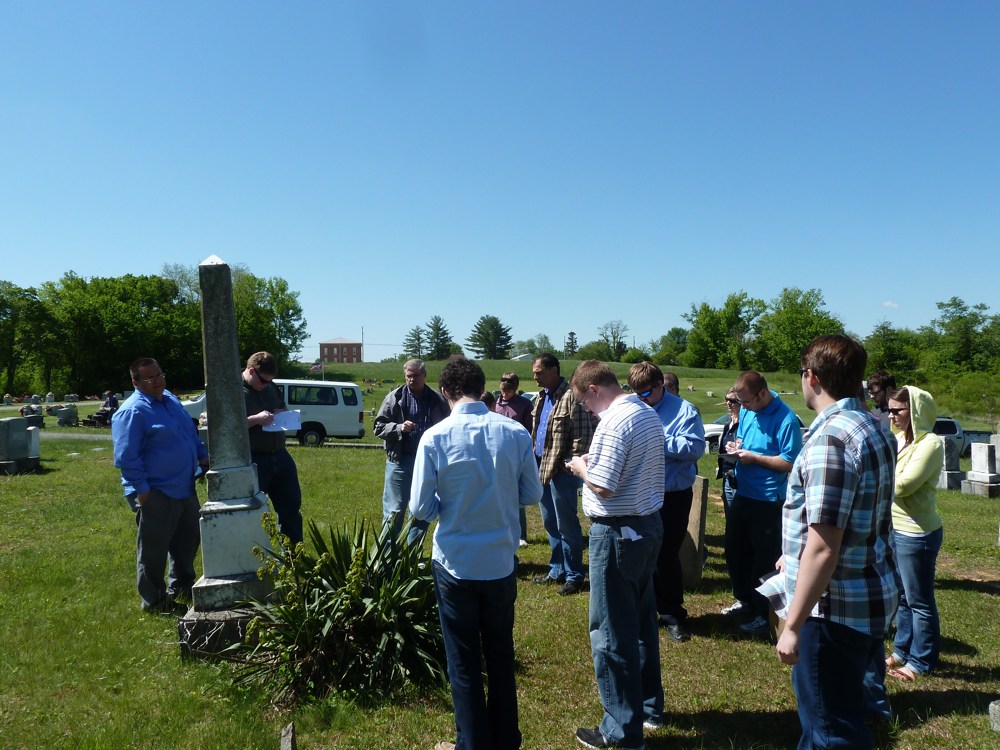
Students Of Southeast Institute Of Biblical Studies At The Grave Of W.D. Carnes, May 2013
Notice The Old Burritt College Campus In The Distance
![]()
